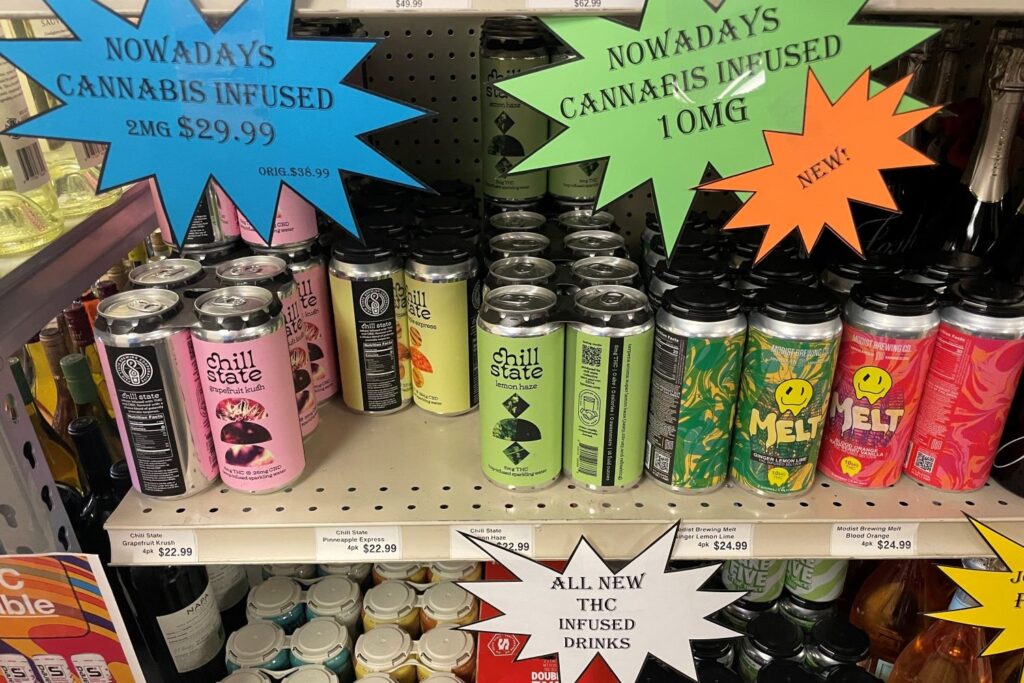
Drinks advertised as THC- and cannabis-infused on the shelves of a Rapid City store in July 2024. (Seth Tupper/South Dakota Searchlight)
South Dakota’s medical cannabis industry voiced its support for sting operations targeting sellers of hemp products that create a marijuana-like high.
The comments from Jeremiah Murphy, a lobbyist for the Cannabis Industry Association of South Dakota, came during Tuesday’s meeting of the state’s Medical Marijuana Oversight Committee.
Murphy’s association represents the state’s 116 licensed medical cannabis cultivators, manufacturers and dispensaries.
The industry “commends the Pennington County Sheriff’s Office” for its sting operation targeting hemp-based THC products at eight Rapid City-area smoke shops and convenience stores, Murphy said.
Rapid City policing agencies target ‘diet weed’ with compliance checks
Law enforcement bought samples of gummies, THC drinks and other products with “hemp-derived” ingredients. Strains of THC is a family of high-inducing molecules found in large concentrations in the cannabis plant.
The hemp plant is a cousin to cannabis that contains tiny quantities of THC. Hemp-derived intoxicants often get their THC from chemically modified or distilled CBD. CBD is a different, nonintoxicating molecule found in cannabis and hemp.
Hemp is legal to cultivate under the 2018 farm bill, and hemp-derived products are legal under federal law. Since mid-2024, however, South Dakota has barred the sale – but not the possession – of products made with chemically synthesized versions of THC.
The Rapid City compliance check followed a July 10 letter from Pennington County State’s Attorney Lara Roetzel to businesses suspected of unlawful hemp sales.
Katy Urban, spokeswoman for Roetzel’s office, says the agencies are waiting for testing results to determine if any laws were broken.
Sioux Falls Police Department spokesman Aaron Benson said the SFPD has performed one compliance check, and is waiting on results from a lab test to determine how to proceed with one case. Benson declined to say how many businesses were visited, citing the open investigation.
Committee hears support for compliance
At Tuesday’s medical marijuana committee meeting, Murphy repeated an assertion he’s used for nearly two years now: The availability of hemp-derived alternatives to medical cannabis puts the state’s highly regulated medical marijuana industry at a disadvantage.
“Why do I go to a doctor and pay him, and why go pay the state to pay even more money, when I can go to the vape shop, or I can go to the hemp store and they’re selling exactly what I need?” Murphy said.
The number of medical marijuana cards issued in the state stands at around 14,000, but changes slightly every day, Whitney Brunner of the Department of Health told the medical marijuana committee Tuesday.
“Any data point presented on patient cards is representative of a snapshot in time,” Brunner said.
Cards issuance has picked up slightly since voters rejected a ballot measure to legalize recreational cannabis last fall, but remained at about 14,000 as of this week. A little more than 70% of the cards have been issued to people for the management of chronic pain, Brunner told the committee.
Medical cannabis purveyors supported the law banning the sale of synthetically altered hemp products, but the law hasn’t led to a crush of cases against sellers. Around 100 charges had been filed as of last month, between juvenile and adult cases, according to the Unified Judicial System. Several of those charges were attached to individual defendants.
Hemp industry sees future beyond consumables
New processing centers raise hopes for South Dakota hemp, tempered by challenges
John Peterson, president of the South Dakota Industrial Hemp Association, said his organization doesn’t have a problem with the rules on consumables.
“They passed the rules, and we want to have only the good players in the game,” said Peterson, whose Dakota Hemp is one of two companies in South Dakota building hemp processing facilities.
South Dakota leads the nation in hemp production. Legally, hemp plants need to be tested and have less than .3% THC. In a typical pre-rolled, smokable cannabis joint, Peterson said, “you’re looking at a 30% THC level.”
“You’re going to want your money back if it’s not that high,” he said.
Peterson said consumable products, with or without intoxicating properties, were among the first to catch on. CBD products, including products like lotions, are often marketed to humans and their pets for their purported health benefits.
Hemp-derived THC products, made “when somebody will take it and process it down to make an unnatural compound,” took off just a few years ago.
“That has been the industry that has financially led the way, but as the industry is taking off, we see the grain, fiber and textile areas as leading products into the future,” Peterson said.
Speaking from a booth at Dakotafest in Mitchell, Peterson listed off a dozen products from a hemp association brochure, including building materials like hempcrete and decking material.
As far as consumables, Peterson said, “we’re not going to scream and holler and say, ‘you’ve got to let us have those back.”
He said he hopes the consumable concerns don’t hamstring the rest of the industry.
“As long as they’re not going out of their way to discriminate against the hemp industry, I’ve got no issues with it.”
GET THE MORNING HEADLINES.
YOU MAKE OUR WORK POSSIBLE.





